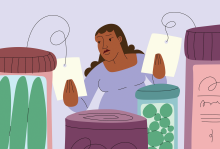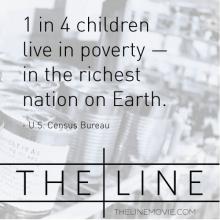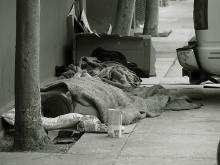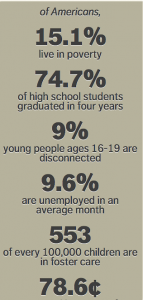child poverty

EVER SINCE THE release of Bessel van der Kolk’s 2014 best-selling book The Body Keeps the Score, trauma education has proliferated. I have seen training in everything from trauma-informed lawyering to trauma-informed care in emergency rooms. Trauma-informed practices have even started making their way into some correctional facilities and corporate boardrooms. Yet much of the popular writing tends to focus deeply on the more personal elements of trauma, rather than systemic elements, such as poverty.
My colleague Derrick Stroud, who survived 27 years in prison and now is a clinician, once described poverty as the “first trauma” in communities of color. The impact of poverty increases the chances of both low educational attainment among children and placement in foster care; this, combined with the challenges faced by under-resourced schools, can become a pipeline to prison. Neighborhoods impacted by poverty can reinforce traumatic conditions, since residents are more likely to witness or experience violence or be profiled by the police. These ecosystemic conditions impact human bodies and produce negative health outcomes that can have detrimental generational effects — all of which can be traced back to under-resourced systems.

FOR MANY, TAX season is a scramble. Where are the receipts? How much do we owe? Why is it so complicated? But it’s also an annual opportunity to review our social contract, our shared moral obligation to fund the common good. The taxes we pay can affirm life, care for our elders, feed the hungry, house the poor, and care for creation. Taxes can also underwrite a bloated military budget that takes life and incentivizes war.
Until 2015, the largest segment of a typical tax bill did not support programs of social uplift for Americans, but instead supported the military-industrial complex and war. Over the last few years, however, there’s been a shift, even as military costs have continued to rise. That shift is due in part to expanded health care access — but also in part due to health care inflation. Now, providing affordable health care for those over 65 or on limited income through Medicare and Medicaid is the most significant portion
of your tax bill. Paying for war or supporting Americans at home are in a battle for top tax billing.
The average U.S. taxpayer contributes more than $13,000 each year in federal income taxes, according to our research at the National Priorities Project. That’s not a small chunk of change for anyone but the wealthiest among us. When we pool our funds, our federal income taxes are a powerful force, accounting for nearly half of federal revenue (much of the rest also comes from us, in the form of other payroll taxes).

Robert Putnam, who spoke this Monday at Georgetown for the Catholic-Evangelical Summit on Overcoming Poverty, gives a great stump speech for poor kids who are falling through the cracks in our society. So much so that moderator John Carr described Putnam as an Old Testament prophet with charts — Isaiah, with a good grasp of Powerpoint.
Our culture has been terrible at providing opportunities to poor children. Putnam’s data finds that poor children have fewer chances to do well in school and less parental involvement, and are generally isolated from society and even from church. With this background, we shouldn’t be surprised that children who are born into poverty have trouble finishing college and building a stable, prosperous life.
Putnam calls this the "chief moral crisis of our time."

I asked a small group of second-graders what they would like to find inside their mailboxes. That was after we read a story about a goose who opened her mailbox and found a kite. I expected to hear answers of things: video games, toys or basketballs. But the first student who raised her hand looked at me with sincere, big brown eyes and said, "I'd like to find a letter from my dad."
In my classroom, my kids say the profoundest things.
As we entered the holiday season, I thought about the answer that student gave me. I thought about what other of my 7-, 8- and 9-year-olds were saying about the holiday season.
For three years, I lived and worked in a large housing project in Louisville, Ky. I was a middle-class, white graduate student, and my background clouded how I saw the people around me. But I finally began to see clearly.

It’s annoying, isn’t it, how American political debate ignores the pressing issues and instead focuses on the trivial? I’m talking about pressing issues like the recently released poverty numbers – nearly 1 in 6 Americans lives in poverty, and the child poverty rate is even higher. That’s 46.2 million people living on less than $23,021 a year for a family of four.
Those are sobering numbers. Here’s another: a new study by Fairness and Accuracy in Reporting shows that of the 10,489 news stories on the campaign this year, just 17 of them addressed poverty in a substantive way. That’s a whopping 0.16 percent of coverage devoted to issues of poverty.
We need to get poverty back on the public agenda. In the richest country in the world, numbers that high should be seen as a moral crisis.

When I walk into Paola's first-grade classroom, I'm aware of her poverty. Nine out of 10 of the students at our school meet the federal poverty level guidelines. She is one of them.
She lives in a small apartment with her grandma, mom, sister and uncle; they make less than $26,170 a year.
As the Nobel Prize-winning economist Paul Krugman reminds us, she is all too likely to suffer from poor nutrition, inadequate health care, an inferior education and a bad future.
I'm struggling against her life-crushing poverty with all of the compassion, creativity and commitment within me.
Yes, I'm aware of her poverty. Today, however, I don't see it.

Politics And Prayers; Senate Passes Insider-Trading Bill; What Childhood Poverty Means (OPINION); Nation-Building Vs. Al-Qaeda-Crushing In Afghanistan; Should All Americans Have To Earn Their Citizenship?; That Former Slave Who Wrote His Ex-Master Never Went Back To Him; NC's Heath Shuler Won't Seek Re-Election To House; Syria: It’s Not Just About Freedom (OPINION); Jobs Report: Unemployment Rate For Returning Veterans Fell 6 Percentage Points.

Private Sector Adds 206,000 Jobs In November; Police Clear Occupy Camps In Los Angeles, Philly; Churches Help Occupy Movement Survive Crackdowns, Winter; Study: Even With More Kids In Poverty, Number Of Uninsured Children Fell 14 Percent Over 3 Years; Poverty Soars For Students In D.C., Montgomery County; Anonymous Iowa Christian Group Launches Attack On Gingrich; Should Fair Trade Certify Giants Like Nestle and Folger's?; Long Lines For Free Holiday Food Vouchers.

GOP Candidates Fight Over Future Of Immigration Reform; The Letter From Evangelical Iowa; Evangelical Good News For Romney?; Child Poverty Rises In 96 Of Top 100 School Districts Since 2007; Undocumented Migrant Whose Lack Of Hope Drove Him To Suicide; Does Your Aid Count?; Is Tim Tebow Performing Miracles? (OPINION)

This weekend, 60 Minutes aired a piece that has been commended by many as a shocking but must-see insight into poverty in the United States today.
Sixteen million children now live in poverty, and for many, they don’t even have a proper place to call home. These situations are even more frequent in areas of the country where traditional industries have collapsed in the wake of the financial crisis – such as the construction industry in central Florida.

Top 10 Reasons Alabama’s New Immigration Law Is A Disaster For The State’s Economy; Undocumented Immigrants Facing Deportation: Caught Up In Confusion, Lost Records, Inconsistent Policy Enforcement, And Difficult Choices; A Deeper Look At Income Inequality; Why The Debt Panel Is In Trouble; How Congress Occupied Wall Street (OPINION – Sarah Palin); 68 Percent Of The Sons Of The 1 Percent Work At Their Dad's Company; More Than 1 In 5 U.S. Children Poor, Census Says.

Perhaps the most important finding from the report is that we have both the experience and the policy tools necessary to cut poverty in half.
Between 1964 and 1973, under both Democratic and Republican administrations, the U.S. poverty rate fell by nearly half (43 percent) as a strong economy and effective public policy initiatives expanded the middle class.
Similarly, between 1993 and 2000, shared economic growth combined with policy interventions such as an enhanced earned income tax credit and minimum wage increase worked together to cut child poverty from 23 percent to 16 percent.
We can't do this alone.
More than 15 percent of the U.S. population now lives in poverty -- the highest rate in 18 years, according to a U.S. Census Bureau report released this morning.
Poverty has risen for the third consecutive year in a row, the new census figures show, with perhaps most distressing are the child poverty numbers, which rose from 20.7 percent in 2009 to 22 percent in 2010.
"The results aren't good," the Rev. Jim Wallis, president and CEO of Sojourners, the largest network of progressive Christians in the United States focused on the biblical call to social justice, said upon reviewing the census report today.